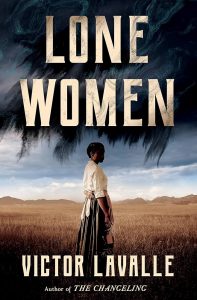Gabino Iglesias Reviews Lone Women by Victor LaValle
 Lone Women, Victor LaValle (One World 978-0-52551-208-0, $27.00, 304pp, hc) March 2023.
Lone Women, Victor LaValle (One World 978-0-52551-208-0, $27.00, 304pp, hc) March 2023.
Victor LaValle is an outstanding storyteller known for his gripping narratives and the elegant flair he brings to speculative fiction. In Lone Women, his latest novel, he mixes these elements with historical fiction and commentary on racial tensions in 1915 Montana to deliver his best novel yet.
The year is 1915, and Adelaide Henry is alone, trying to stake her claim as a homesteader and survive the bitter cold and harsh loneliness of Montana. She used to have a family back in California, but things took a very dark turn – mostly by her own hand – and she had to flee under the cover of night and make her way to Montana carrying only a huge, very heavy steamer trunk that she must keep locked at all times. With her trunk and the constant fear of being discovered as company, Adelaide becomes one of the ‘‘lone women’’ trying to stay on her land long enough to make it hers. Unfortunately, things are more complicated than that because Adelaide can’t leave the trunk unattended for long, and whenever it opens, people go missing. As Adelaide makes friends and tries to build a life from scratch in Montana, the thing in the trunk causes a lot of trouble, and an encounter with some youngsters she met on her way to the homestead sets her on a dark path of revenge.
Lone Women flows beautifully. This is a dark tale with some gory passages and occasional instances of brutality and violence, but it also contains a lot of camaraderie, great economy of language, and unexpected moments of humor. It also brilliantly explores what it’s like to be the only person of color in an inhospitable terrain and what it must’ve been like for lone women to scratch out a living in extremely rough circumstances, especially if they were women of color.
LaValle does several things very well here, but two merit special attention. The first is his character development. Adelaide is truly a memorable character. She is far from perfect, but she’s also brutally honest and very quickly becomes a character you root for even if her ‘‘introduction’’ to readers includes the confession that she murdered her own parents and then set fire to the house she shared with them for years.
The second element that makes this an outstanding novel is the seamless way in which LaValle blends genres together. The presence of the thing in the trunk, which becomes the center of the story a few times and even has a few very poetic chapters told from its perspective, makes this a horror novel that doesn’t shy away from the violence, creepiness, and bloodshed fans of the genre have come to expect. However, this is also a literary novel that explores grief, guilt, solitude, justice, love, revenge, and racism. And that’s not all. This narrative is also historical, and the research that went into it – along with the many details, information, and general atmosphere – easily places readers in Montana in 1915.
While LaValle accomplishes a lot in Lone Women, perhaps the novel’s greatest triumph is how wonderfully engrossing it is. Sure, the characters are well-developed, the dialogue is fantastic, and the action always moves forward at top speed, but all those things shine brighter because we want to know what happens next and because we feel like we’re there, feeling the bite of the wind on our face as we stare at a thing gnashing a horse and spilling its blood into the frozen ground. By the time the big revelations come in the last third of the book, we realize just how in control of the story the author has been at all times, and just how deep Adelaide’s secret can cut. Yes, LaValle is a great storyteller, but he also possesses and uncanny talent for pulling readers into the worlds he creates, and his powers are stronger than ever in Lone Women. Don’t miss it.
Gabino Iglesias is a writer, journalist, professor, and book reviewer living in Austin TX. He is the author of Zero Saints and Coyote Songs and the editor of Both Sides. His work has been nominated to the Bram Stoker and Locus Awards and won the Wonderland Book Award for Best Novel in 2019. His short stories have appeared in a plethora of anthologies and his non-fiction has appeared in the New York Times, the Los Angeles Times, and CrimeReads. His work has been published in five languages, optioned for film, and praised by authors as diverse as Roxane Gay, David Joy, Jerry Stahl, and Meg Gardiner. His reviews appear regularly in places like NPR, Publishers Weekly, the San Francisco Chronicle, Criminal Element, Mystery Tribune, Vol. 1 Brooklyn, the Los Angeles Review of Books, and other print and online venues. He’s been a juror for the Shirley Jackson Awards twice and has judged the PANK Big Book Contest, the Splatterpunk Awards, and the Newfound Prose Prize. He teaches creative writing at Southern New Hampshire University’s online MFA program. You can find him on Twitter at @Gabino_Iglesias.
This review and more like it in the September 2023 issue of Locus.
 While you are here, please take a moment to support Locus with a one-time or recurring donation. We rely on reader donations to keep the magazine and site going, and would like to keep the site paywall free, but WE NEED YOUR FINANCIAL SUPPORT to continue quality coverage of the science fiction and fantasy field.
While you are here, please take a moment to support Locus with a one-time or recurring donation. We rely on reader donations to keep the magazine and site going, and would like to keep the site paywall free, but WE NEED YOUR FINANCIAL SUPPORT to continue quality coverage of the science fiction and fantasy field.
©Locus Magazine. Copyrighted material may not be republished without permission of LSFF.








